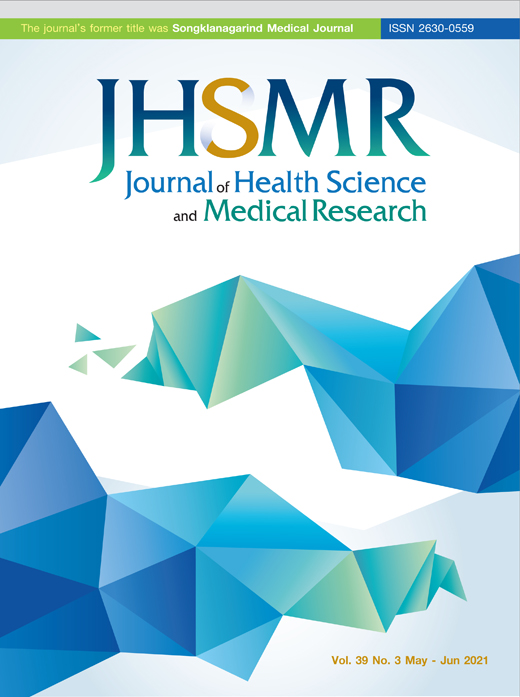Family System Functioning in Caring for Thai Survivors with Severe Traumatic Brain Injury
DOI:
https://doi.org/10.31584/jhsmr.2021779Keywords:
caring, family system functioning, severe traumatic brain injuryAbstract
Objective: This study aimed to describe family system functioning, in providing care for a family member, after surviving a severe traumatic brain injury (TBI).
Material and Methods: A cross sectional survey, using a self-report questionnaire, was conducted with 77 family members; from 32 families, caring for survivors from one province in southern Thailand. Family system functioning was measured using the Family Assessment Measure III (FAM-III) General Scale, Thai version as well as a demographic questionnaire. Descriptive statistics were applied to analyze family functioning including means, standard deviation, percentage and T-scores.
Results: The findings showed that the overall family system functioning existed within the moderate level (M=49.94, S.D. =8.99). The finding also indicated moderate levels of functioning within the FAM III subscales.
Conclusion: The present findings provide evidence that family systems functioning was at a moderate level in those providing care for a family member who had sustained a severe TBI. This level of function might pose difficulty regarding ability of the family towards a variety of basic, developmental and crisis tasks. The investigation suggests a future study, complementing quantitative methods with qualitative approaches.
References
World Health Organization. Violence and injury prevention and disability (VIP): neurotrauma [homepage on the Internet]. Geneva: WHO; 2018 [cited 2020 May 20]. Available from: https://www.who.int/violence_injury_prevention/road_traffic/ activities
Oyesanya T, Brown RL, Turkstra LS. Caring for patients with traumatic brain injury: a survey of nurses' perceptions. J Clin Nurs 2017;26:1562-74.
Bureau of Epidemiology, Ministry of Public Health. Annual Epidemiological Surveillance Report [homepage on the Internet]. Nonthaburi: BOE; 2018 [cited 2020 May 14]. Available from: http://apps.boe.moph.go.th/boeeng/annual.php
Sherer M, Vaccaro M, Whyte J, Giacino JT. The consciousness consortium. Facts about the vegetative and minimally conscious states after severe brain injury. Houston: University of Washington/MSKTC; 2019 [cited 2018 Jun 16]. Available from: https://www.brainline.org/article/facts-about-vegetativeand- minimally-conscious-states-after-severe-brain-injury? page=4
Andelic N, Sigurdardottir S, Arango-Lasprilla JC, Alison GK. Long-term functional and psychosocial consequences and health care provision after traumatic brain injury. Behav Neurol J 2016;10:1-3.
Stocchetti N, Zanier ER. Chronic impact of traumatic brain injury on outcome and quality of life: a narrative review. Crit Care J 2016;20:1-10.
Skinner H, Steinhauer PD, Sitarenios G. Family assessment measure (FAM) and process model family functioning. J Fam Ther 2000;22:190-210.
Evans-Roberts C, Weatherhead S, Vaughan F. Working with families following brain injury. Rev Chil Neuropsicol 2014;9: 21-30.
Ponsford J, Schonberger M. Family functioning and emotional state two and five years after traumatic brain injury. J Int Neuropsych Soc 2010;16,306–17.
Gan C, Schuller R. Family system outcome following acquired brain injury: clinical and research perspectives. Brain Injury J 2002;16:311–22.
Gan C, Campbell KA, Gemeinhardt M, McFadden GT. Predictors of family system functioning after brain injury. Brain Injury J 2006;20:587–600.
Miro MM, Family functioning following traumatic brain injury: a cross-cultural investigation. A dissertation submitted in partial satisfaction of the requirement for the degree of doctor in psychology. Miami: ProQuest Information and Learning; 2003.
Wiseso W, Fongkaew W, Pinyokham N, Spiers J. Caring for terminally Ill persons with cancer: experiences of Thai Buddhist family caregivers. Pac Rim Int J Nurs Res Thail 2017;21:317- 30.
Zaker SB, Boostanipoor A. Multiculturalism in counseling and therapy: marriage and family issues. Rev Int Psicol Ter Psicol 2016;8:53-57.
Rukkeattiyos S, Changmai S, Hinjiranan, S. The outcomes of adjustment program of caregiver of traumatic brain injury patients at a tertiary level hospital in Petchaburi Province. TJNC 2013;62:43-51.
Narkthong N. Effect of Tailored discharge preparedness program on caregiver’s discharge readiness in caring for patients with traumatic brain injury. Songkhla: Prince of Songkla University; 2014.
Daniel WW. Biostatistics: a foundation for analysis in the health sciences. 7th ed. New York: John Wiley and Sons; 1999.
Wongsawang N, Lagampan S, Lapvongwattana P, Bowers BJ. Family caregiving for dependent older adults in Thai families. J Nurs Scholarsh 2013;45,336-43.
Burns N, Grove SK. The practice of nursing research: appraisal, synthesis, and generation of evidence. 8th ed. St. Louis, Missouri: Elsevier Saunders; 2017.
Skinner HA, Steinhauer PD, Santa-Barbara J. Family assessment Measure-III (FAM III) Technical Manual. Toronto: Multi Health Systems; 1995.
World Health Organization. Process of translation and adaptation of instruments [homepage on the Internet]. Geneva: WHO; 2018 [cited 2018 June 20]. Available from: https://www.who. int/substance_abuse/research_tools/translation/en/
Rattanasak D, Nantachaipan P, Sucamvang K, Moongtui W. A causal model of well-being among caregivers of people with spinal cord injury. Pac Rim Int J Nurs Res Thail 2013;17:342-55.
Lumprom O. Family hardiness, social support, and well-being of Thai traumatic brain injury family caregivers. Songkhla: Prince of Songkla University; 2017.
Prombut P, Piaseu N, Sakulhongsopon S. Factors related to stress of family caregivers of patients with stroke at home. Ramathibodi Nurs J 2014;20:82-96.
Meecharoen W, Sirapo-ngam Y, Mongkong S, Oratai P, Northouse LL. Factors influencing quality of life among family caregivers of patients with advance cancer: a causal model. Pac Rim Int J Nurs Res Thail 2013;17:304-16.
Hunsa S, Kane C. Caring for the seriously mentally Ill in Thailand: Buddhist family caregiving. Arch Psychiat Nurs 2005;19:44-57. 27. Hofstede HG, Hofstede JG. Cultures and organizations: software of the mind. New York: McGraw Hill Professional; 2005.
Burnard P, Naiyapatana W. Culture and communication in Thai nursing: a report of an ethnographic study. Int J Nurs Stud 2004;41:755-65.
Friedman MM, Bowden VR, Jones EG. Family nursing: research theory and practice. 5th ed. Upper Saddle River N.J.: Prentice Hall; 2003.
Downloads
Published
How to Cite
Issue
Section
License

This work is licensed under a Creative Commons Attribution-NonCommercial-NoDerivatives 4.0 International License.
























